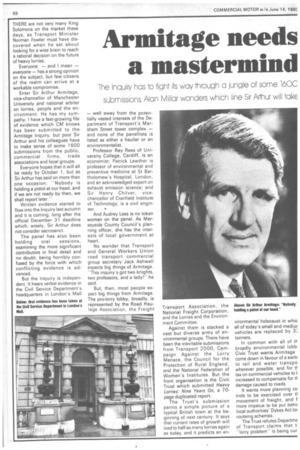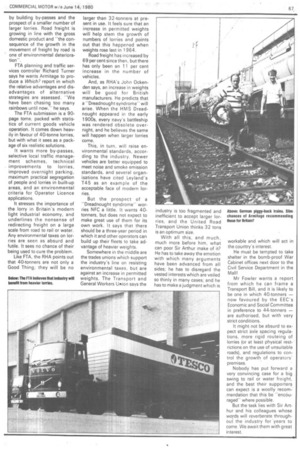Armitage needs a mastermind
Page 68

Page 69

If you've noticed an error in this article please click here to report it so we can fix it.
The Inquiry has to fight its way through a jungle of some 160C submissions. Alan Millar wonders which line Sir Arhur will take
THERE are not very many King Solomons on the market these days, as Transport Minister Norman Fowler must have discovered when he set about looking for a wise brain to reach a rational decision on the future of heavy lorries.
Everyone — and I mean — everyone — has a strong opinion on the subject, but few citizens of the realm can arrive at a workable compromise.
Enter Sir Arthur Armitage, vice-chancellor of Manchester University and national arbiter on lorries, people and the environment. He has my sympathy. I have a fast-growing file of evidence which CM knows has been submitted to the Armitage Inquiry, but poor Sir Arthur and his colleagues have to make sense of some 1600 submissions from the public, commercial firms, trade associations and local groups.
Everyone hopes that it will all be ready by October 1, but as Sir Arthur has said on more than one occasion: "Nobody is holding a pistol at our head, and if we are not ready by then, we shall report later."
Written evidence started to flow into the Inquiry last autumn and it is coming, long after the official December 31 deadline which, wisely, Sir Arthur does not consider sacrosanct.
The panel has also been holding oral sessions, examining the more significant contributors in final detail and no doubt, being horribly confused by the force with which' conflicting evidence is advanced.
But the Inquiry is independent. It hears verbal evidence in the Civil Service Department's headquarters in London's Mall
— well away from the potentially vested interests of the Department of Transport's Marsham Street tower complex — and none of the panellists is listed as either a haulier or an environmentalist.
Professor Ray Rees of University College, Cardiff, is an economist; Patrick Lawther is professor of environmental and preventive medicine at St Bartholomew's Hospital, London, and an acknowledged expert on exhaust emission science; and Sir Henry Chilver, vicechancellor of Cranfield Institute of Technology, is a civil engineer.
And Audrey Lees is no token woman on the panel. As Merseyside County Council's planning officer, she has the interests of local government at heart.
No wonder that Transport and General Workers Union road transport commercial group secretary Jack Ashwell expects big things of Armitage. -This inquiry's got two knights, two professors, and a lady!" he said.
But, then, most people expect big things from Armitage. The pro-lorry lobby, broadly, is represented by the Road Haulage Association, the Freight Transport Association, the National Freight Corporation, and the Lorries and the Environment Committee.
Against them is stacked a vast but diverse army of environmental groups. There have been the inevitable submissions from Transport 2000, Campaign Against the Lorry Menace, the Council for the Protection of Rural England, and the National Federation of Women's Institutes. But the front organisation is the Civic Trust which submitted Heavy Lorries: Nine Years On, a 70page duplicated report.
The Trust's submission paints a simple picture of a typical British town at the beginning of next century. It says that current rates of growth will lead to half as many lorries again as today, and it predicts an en vironmental holocaust in whic all of today's small and mediur vehicles are replaced by 3: ton ners.
In common with all of tibroadly environmental lobb' Civic Trust wantsArmitage come down in favour of a switc to rail and water transpo wherever possible, and for tF tax on commercial vehicles to k increased to compensate for t1 damage caused to roads.
It wants more planning co trols to be exercised over ti movement of freight, and f more impetus to be put behii local authorities' Dykes Act lor routeing schemes.
The Trust refutes Departme of Transport claims that tI "lorry problem" is being cur by building by-passes and the prospect of a smaller number of larger lorries. Road freight is growing in line with the gross domestic product and "the con sequence of the growth in the movement of freight by road is one of environmental deterioration".
FTA planning and traffic services controller Richard Turner says he wants Armitage to pro duce a Which? report in which the relative advantages and dis advantages of alternative strategies are assessed. "We have been chasing too many rainbows until now," he says.
The FTA submission is a 90page tome, packed with statis tics of current goods vehicle operation. It comes down heavily in favour of 40-tonne lorries, but with what it sees as a package of six realistic solutions.
It wants more by-passes, selective local traffic manage ment schemes, technical improvements to lorries, improved overnight parking, maximum practical segregation of people and lorries in built-up areas, and an environmental criteria for Operator Licence applications.
It stresses the importance of the lorry in Britain's modern light industrial economy, and underlines the nonsense of redirecting freight on a large scale from road to rail or water. Any environmental taxes on lorries are seen as absurd and futile. It sees no chance of their being used to cure the problem.
Like FTA, the RHA points out that 40-tonners are not only a Good Thing; they will be no larger than 32-tonners at present in use. It feels sure that an increase in permitted weights will help stem the growth of numbers of lorries and points out that this happened when weights rose last in 1964.
Road freight has increased by 69 per cent since then, but there has only been an 11 per cent increase in the number of vehicles.
And, as RHA's John Ockenden says, an increase in weights will be good for British manufacturers. He predicts that a "Dreadnought syndrome" will arise. When the HMS Dread nought appeared in the early 1900s, every navy's battleship was rendered obsolete overnight, and he believes the same will happen when larger lorries come.
This, in turn, will raise environmental standards, accor ding to the industry. Newer vehicles are better equipped to meet noise and smoke emission standards, and several organisations have cited Leyland's T45 as an example of the acceptable face of modern lorries.
But the prospect of a "Dreadnought syndrome'' wor ries NFC a little. It wants 40 tanners, but does not expect to make great use of them for its own work. It says that there should be a three-year period in which it and other operators can build up their fleets to take advantage of heavier weights.
Somewhere in the middle are the trades unions which support the industry's line on resisting environmental taxes, but are against an increase in permitted weights. The Transport and General Workers Upilion says the industry is too fragmented and inefficient to accept larger lorries, and the United Road Transport Union thinks 32 tons is an optimum size.
With all this, and much, much more before him, what can poor Sir Arthur make of it? He has to take away the emotion with which many arguments have been advanced from all sides; he has to disregard the vested interests which are veiled so thinly in many cases; and he hasto make a judgment which is workable and which will act in the country's interest.
He must be tempted to take shelter in the bomb-proof War Cabinet offices next door to the Civil Service Department in the Mall!
Mr Fowler wants a report from which he can frame a Transport Bill, and it is likely to be one in which 40-tanners — now favoured by. the EEC's Economic and Social Committee in preference to 44-tonners — are authorised, but with very strict conditiOns.
It might not be absurd to expect strict 'axle spacing regulations, more rigid routeing of lorries (or at least physical restrictions on the use of unsuitable roads), and regulations to control the growth of operators' premises.
Nobody has put forward a very convincing case for a big swing to rail or water freight, and the best their supporters can expect is a woolly recom.mendation that this be "encouraged" where possible.
But the task lies with Sir Arthur and his colleagues whose words will reverberate throughout the industry for years to come We await them with great interest.
















































































































